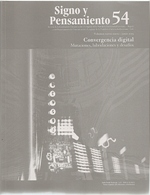Abstract
The present article analyzes the social relations that allowed for the emergence of Internet in Colombia, following the theoretical proposal of the French sociologist Pierre Bourdieu. We look at the period 1986 - 2007, to show that the State was, in fact, the main agent in charge of dealing with a set of conditions that allowed for the competition among specific groups offering a service operating under the law of supply and demand. In other words, it was the most important actor to create the sort of conditions that made possible supply – and – demand interactions between agents. In the first part, we analyze the context of economic opening and market liberalization; in the second, the creation of the Comisión de Regulación de Telecomunicaciones and the Ministry of Communications; and finally, we examine more recent dynamics that have dissolved the internet field into the wider field of telecommunications field.
Bourdieu, P. (1986), The Forms of Capital, West Port, Greenwood Press.
Bourdieu, P. (1997), Razones prácticas sobre la teoría de la acción, Barcelona, Anagrama.
Bourdieu, P. (1998), La distinción: criterios y bases sociales del gusto, Madrid, Taurus.
Bourdieu, P. (1999), Meditaciones pascalianas, Barcelona, Anagrama.
Bourdieu, P. (2003), Las estructuras sociales de la economía, Barcelona, Anagrama.
Bustamante, X. y Fajardo, I. (2000), Infraestructura de Internet en Colombia. Informe final de conectividad nacional, Bogotá, Centro del Conocimiento del Negocio.
Bourdieu, P y Wacquant, L. J. D. (1995), Respuestas por una antropología reflexiva, México, Grijalbo.
“Challenges to Academic Networks in Latin America: The Case of Colombia’s Red CETCOL” (1997) [en línea], disponible en: http:// som.csudh.edu/fac/lpress/devnat/nations/ colombia/challenge/
Colombia, Consejo de Estado, Sala de Consulta y Servicio Civil (2001), “Internet. Nombres de dominio. ¿El dominio ‘.co’ tiene carácter público? ¿Tiene competencia el Estado colombiano para regularlo?” [en línea], por el consejero ponente: César Hoyos Salazar, disponible en: http://gecti.uniandes.edu.co/docs/ConsejodeEstado%5B1%5D.co.doc
Colombia, Consejo de Estado, Sala de lo Contencioso Administrativo (2001), por el consejero ponente: Alier E. Hernández Enríquez, disponible en: http://www.javeriana.edu.co/ biblos/tesis/derecho/dere4/Tesis-41.pdf
Colombia, Ministerio de Comunicaciones (1982), Decreto 2328, de 2 de agosto de 1982, disponible en: http://www.mincomunicaciones.gov.co.
Colombiamovil (2006), “Prospectiva en el sector tecnología de información y comunicaciones (tic) colombiano para el año 2010” [en línea], disponible en http://www.ascolfa.edu.co/ mod.php?mod=docs&op=see&lid=150
Comisión de Regulación de Telecomunicaciones (2000a), “El sector de las telecomunicaciones en la década de los noventa en Colombia” [en línea], disponible en: http://www.crt.gov.co/ Documentos/BibliotecaVirtual/publi_sector90/Cap1_LasTelecColombia.pdf.
Comisión de Regulación de Telecomunicaciones (2000b), “Infraestructura de Internet en Colombia. Año 2000” [en línea], disponible en: http://www.crt.gov.co/crt_2001-2004/ documentos/biblioteca/InformeInternetColombia2000.pdf
Comisión de Regulación de Telecomunicaciones (2007), “Telecomunicaciones: hechos y tendencias” [en línea], disponible en: http://www. crt.gov.co/Documentos/BibliotecaVirtual/ InformeSectorial/Informe_sectorial_8.pdf
Departamento Nacional de Planeación (2000), “Documento Conpes 3072. Agenda de conectividad” [en línea], disponible en: http://www.agenda.gov.co/documents/files/ conpes%203072.pdf.
Departamento Nacional de Planeación (2004), “Documento Conpes 3302”, disponible en: http://www.dnp.gov.co/archivos/documentos/Subdireccion_Conpes/3302.pdf.
Departamento Nacional de Planeación (2005), “Documento Conpes 2775”, disponible en: http://www.dnp.gov.co/archivos/documentos/Subdireccion_Conpes/2775.pdf Empresa Nacional de Telecomunicaciones. (1995), Del maguaré a la fibra óptica. Crónica de las comunicaciones, Bogotá, Telecom.
Escobar, A. (1996), La invención del Tercer Mundo, Bogotá, Norma.
García, E. (2002), Dominio <.co> Aspectos relativos a su naturaleza jurídica [trabajo de grado], Facultad de Ciencias Jurídicas, Pontificia Universidad Javeriana.
Islas, O. (2006), “El día de Internet” [en línea], en Razón y Palabra, núm. 49, disponible en http://www.cem.itesm.mx/dacs/publicaciones/logos/espejo/2006/abr17.html.
Meneses, A. (2000), El sector de las telecomunicaciones en Colombia. Años noventa, Bogotá, Comisión de Regulación de Telecomunicaciones.
Montenegro, S. y Niño, L. C. (2001), “La tecnología de la información y de las comunicaciones en Colombia” [Proyecto andino de competitividad][En línea], disponible en: http://www. caf.com/attach/4/default/ITColombia.pdf.
Portafolio (2005), “La unión de Telmex y Telecom, un negocio que vale 3.400 millones de dólares” [en línea], disponible en: http://www.portafolio.com.co/port_secc_online/porta_econ_online/2005-08-26/articuloweb-nota _ interior _ porta-2505912.html
Portafolio (2006), “Telefónica, nueva socia estratégica de Telecom”. [en línea], disponible en: http:// www.portafolio.com.co/port_secc_online/porta_econ_online/2006-04-07/articuloweb-nota _ interior _ porta-2830715.html
Revista de la Universidad Nacional (2002), “Debate por el dominio.co”, Universidad Nacional.
Salcedo, F. (2002), “Historia de la Internet en Colombia” [en línea], disponible en: http:// uque.uniandes.edu.co/~fsalcedo/voc/Historia%20Internet_2002.htm
Sin, H. (2004, 17 de mayo), “Diez años de Internet en Colombia”, en La República.
This journal is registered under a Creative Commons Attribution 4.0 International Public License. Thus, this work may be reproduced, distributed, and publicly shared in digital format, as long as the names of the authors and Pontificia Universidad Javeriana are acknowledged. Others are allowed to quote, adapt, transform, auto-archive, republish, and create based on this material, for any purpose (even commercial ones), provided the authorship is duly acknowledged, a link to the original work is provided, and it is specified if changes have been made. Pontificia Universidad Javeriana does not hold the rights of published works and the authors are solely responsible for the contents of their works; they keep the moral, intellectual, privacy, and publicity rights.
Approving the intervention of the work (review, copy-editing, translation, layout) and the following outreach, are granted through an use license and not through an assignment of rights. This means the journal and Pontificia Universidad Javeriana cannot be held responsible for any ethical malpractice by the authors. As a consequence of the protection granted by the use license, the journal is not required to publish recantations or modify information already published, unless the errata stems from the editorial management process. Publishing contents in this journal does not generate royalties for contributors.


